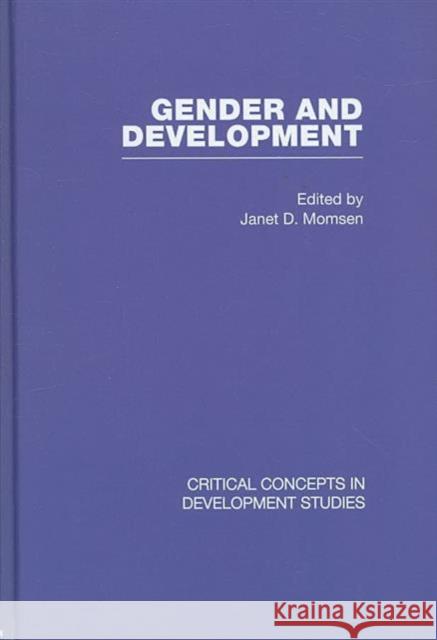Gender and Development » książka
Gender and Development
ISBN-13: 9780415422727 / Angielski / Twarda / 2008
Edited and introduced by a leading researcher and activist, this four-volume Major Work brings together both cutting-edge and canonical research about gender and development which enables development scholars, policy makers and workers to understand and address such challenges in this area more effectively.
It is increasingly apparent that the growing challenges facing development scholars, policy-makers, and practitioners in the twenty-first century require a more sophisticated understanding of the importance of gender than has hitherto been the case. At a time when the forces of globalization are transforming economies and peoples, women throughout the world are still marginalized both economically and politically. In particular, new rulings by the World Trade Organization threaten the exports of many developing countries and jobs—often those held by women—are being lost. Such changes are also significantly affecting men and masculinities as gender roles and relations are transformed. Furthermore, global warming is threatening environments and natural resources, such as forests and water, and creating specific—but different—problems for both men and women in developing countries.
Edited and introduced by a leading researcher and activist, this four-volume Major Work in the Routledge Critical Concepts in Development series brings together both cutting-edge and canonical research about gender and development which will enable development scholars, policy-makers, and workers to understand and address such challenges more effectively. Moreover, work on gender and development continues to be very wide-ranging, and increasingly draws on scholarship and insights from across the social sciences and beyond. Much of this literature remains inaccessible, or is highly specialized and compartmentalized, so that it is ever more difficult to gain an informed and comprehensive overview of the current and historical issues and debates. The sheer scale of the growth in research output in gender and development—and the breadth of the field—makes this collection especially timely and meets the demand for a wide-ranging, multidisciplinary perspective on this fascinating and important subject.
Volume I (‘Theory and Classics’) provides an historical overview of the classic early contributions to the field of gender and development and brings together the best foundational scholarship, beginning with a piece from Ester Boserup’s Woman’s Role in Economic Development (1970). It also includes theoretical papers on the changing approaches to gender and development, and on development policy in relation to gender.
Volume II (‘Policy and Practice’) gathers together the official texts in gender and development, including the major UN treaties, together with key conference conclusions concerning gender and development. The volume includes material drawing on the Women’s Conferences in Mexico City, Nairobi and Beijing, and on Beijing +5 and Beijing +10. In addition, the volume contains material from the Cairo Conference on Population, and from the Rio de Janeiro and Johannesburg Environment Conferences. Volume II also includes material on the Convention on the Elimination of all Forms of Discrimination (CEDAW), the Commission on the Status of Women, the Millennium Development Goals, and the United Nations Development Fund for Women (UNIFEM). The US Percy Amendment and similar policy statements from the UK and Canada, and from the World Bank, are also included.
The third and fourth volumes are concerned with economic and cultural issues respectively and are illustrated by case studies from the global South. Volume III (‘Natural Resource Use, Microfinance, Labour, and Migration’) focuses on the gender division of labour and explores issues such as domestic service; factory work; tourism; agriculture; and sex work. It also includes scholarship on issues such as gendered access to natural resources including land and water.
Volume IV (‘Aspects of Culture and Health’) collects the essential scholarship concerned with recent changes related to global economic and political restructuring. Journal articles and other material here include studies on migration; reproductive rights; health (including the gender aspects of HIV/AIDS); violence and warfare; identity; gendered political roles; gender and fieldwork; positionality, indigenous peoples; and gender roles in cultural survival and biodiversity.
With introductions, newly written by the editor, which place the collected material in its historical and intellectual context, Gender and Development is an essential collection destined to be valued by scholars, students, and practitioners as a vital research resource.











